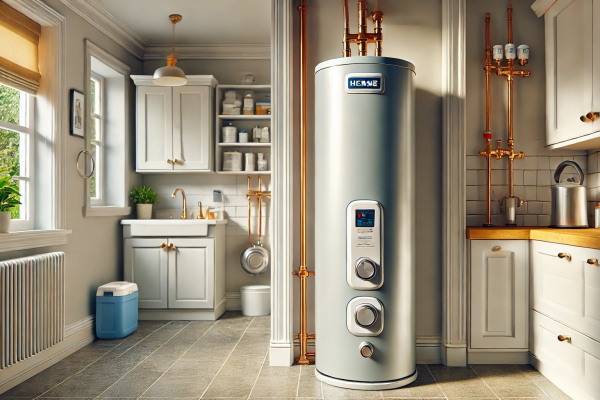
Don’t Wait Until It’s Too Late: 7 Signs Your Water Heater Needs Replacing
A functioning water heater is essential in any home. Think about it: hot showers, clean dishes, warm baths—all rely on this hardworking appliance. But what happens when your water heater starts to fail? A cold shower in the middle of your morning routine can be a rude awakening, but it’s not just inconvenient—it’s a sign of something much more serious.
In a state like Texas, where the summers are scorching and the winters can be unpredictable, a reliable water heater is vital. That’s why it’s essential to know the signs that your water heater is on its last legs, so you’re not left out in the cold. Let’s explore the seven key signs you need to watch out for.
1. Your Water Heater Is Over 10 Years Old
When Does Age Become an Issue?
Like any appliance, water heaters don’t last forever. On average, a water heater can last 10-15 years, but after that, its performance begins to degrade. If your water heater is at least 10 years old, or you can’t recall when it was last replaced, it’s time to consider a new one.
In Texas, where water usage tends to be high, your heater might be running longer and harder than those in cooler climates, speeding up wear and tear. By the time it’s 10 years old, it’s already seen significant usage, and chances are, it’s using more energy than necessary.
2. You Notice Leaks Around the Heater
The Danger of Leaks: Avoid Costly Repairs
Leaks are a serious red flag. If you find puddles of water around your water heater, it could be a sign that the tank is deteriorating. These leaks don’t just signal a failing appliance; they could also cause significant water damage to your home.
In areas like Houston, where high humidity levels can accelerate corrosion, leaks may occur sooner than expected. Addressing leaks immediately can prevent costly damage to your flooring and walls.
3. Your Water Heater Is Making Strange Noises
Understanding the Sounds Your Heater Makes
Your water heater shouldn’t be making any strange noises. If you start hearing popping, crackling, or rumbling, it’s likely that sediment has built up at the bottom of the tank. As water heats up, the sediment causes the water to boil and creates these disruptive noises.
This issue is common in areas with hard water, like San Antonio or Dallas, where mineral buildup can accumulate quickly. Over time, these noises can indicate that the tank is struggling to operate efficiently and is at risk of failure.
4. The Water Smells or Tastes Funky
What Your Water Is Trying to Tell You
If your hot water has a strange metallic or sulfur-like odor, or it tastes funny, it could be a sign that your water heater’s tank is corroding. A corroded tank not only impacts water quality but could also lead to leaks.
If you notice metallic-tasting water, it might also be due to Texas’ hard water, but if the smell is sulfurous, it’s definitely a sign that your water heater is on the decline.
5. Rust in the Sink or Water
How Corrosion Affects Your Water Quality
If you notice rust in your hot water, either in the sink or on your water heater, it’s a strong indicator that the inside of the tank is rusting. This can lead to poor water quality and even leaks, which could lead to serious structural damage in your home.
In Texas, where mineral buildup is a common issue, rust in water isn’t always related to the heater’s age but can accelerate deterioration over time. If your water has visible rust or sediment, you should get the heater checked immediately.
6. Your Family Uses a Lot of Hot Water
Managing High Demand with a New Heater
In larger homes or homes with many occupants, a water heater is under constant strain. If you have multiple showers running daily, frequent laundry loads, and a lot of hot water usage, your heater is working harder than it should. Over time, this usage can wear out the internal components, especially if the heater is on the older side.
In Texas, where temperatures are often high and residents use more water during the summer months, your water heater could be under constant strain, leading to quicker wear.
7. Your Water Gets Warm, But Not Hot
Why Tepid Water Is a Sign of a Failing Heater
Tepid or lukewarm water is one of the clearest signs that your water heater is malfunctioning. If the water doesn’t get hot no matter how much you turn up the temperature, it’s likely a sign of a faulty thermostat or a failing heating element. This is a clear sign that the water heater isn’t functioning properly and should be replaced.
Tepid water is more than just annoying—it could also lead to higher energy bills, as your water heater struggles to reach the desired temperature.
Conclusion: When to Replace Your Water Heater in Texas
In a state like Texas, where water usage is high, and the weather can be extreme, keeping your water heater in top condition is vital. If you notice any of these signs, it might be time to replace your water heater to ensure your family’s comfort and avoid the potential costs of emergency repairs.
By being proactive about replacing your water heater when necessary, you can save yourself from cold showers and costly damages while ensuring your home’s plumbing system is working at its best. Don’t wait until it’s too late—take action today and ensure your home stays warm and efficient for years to come.






